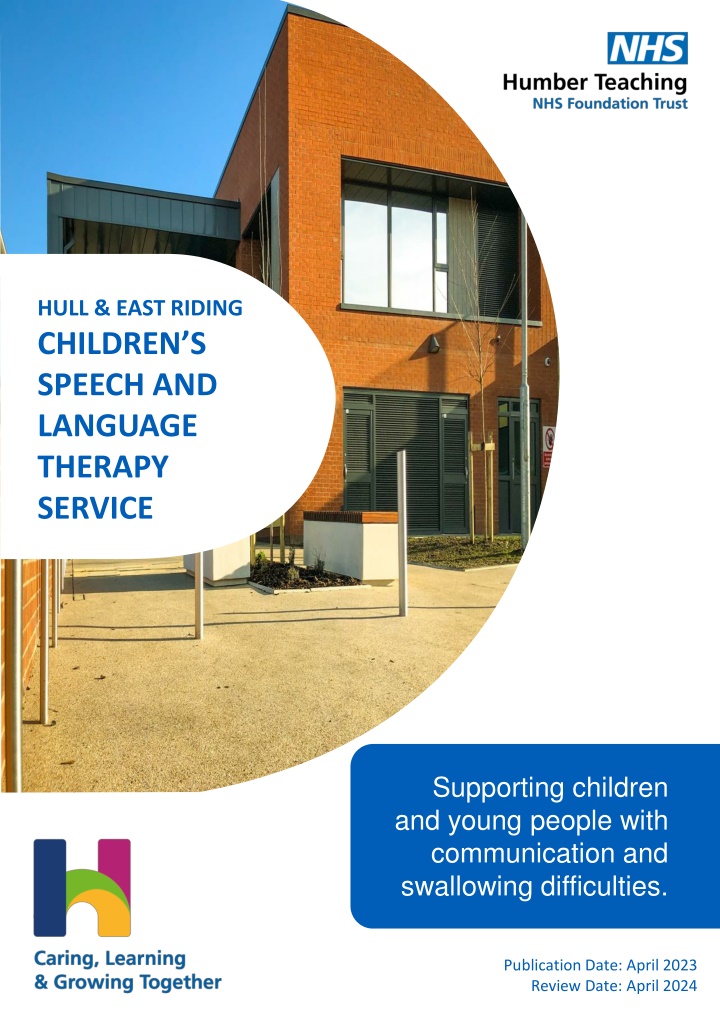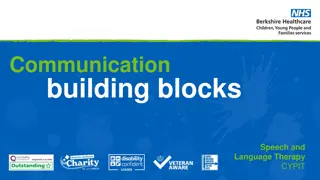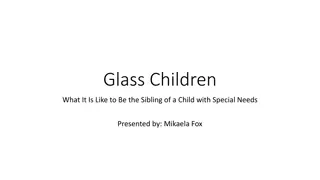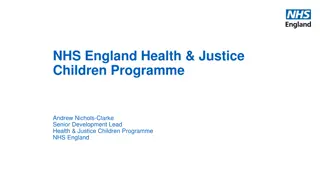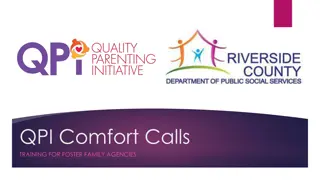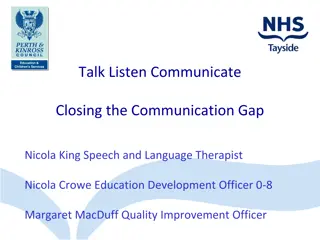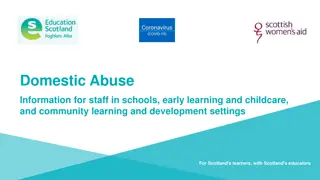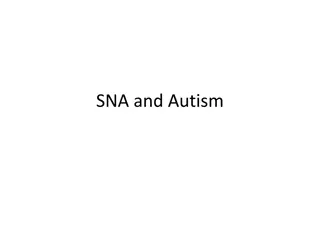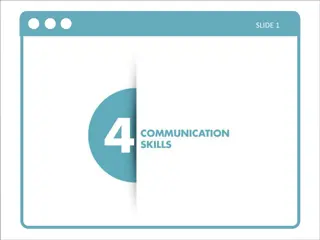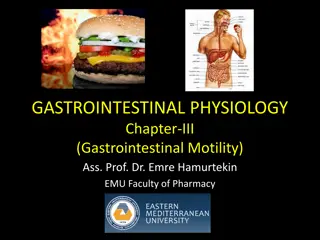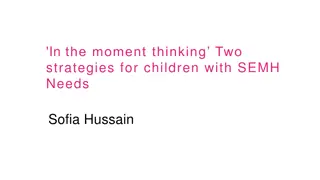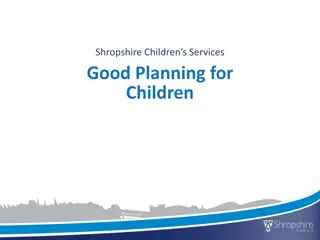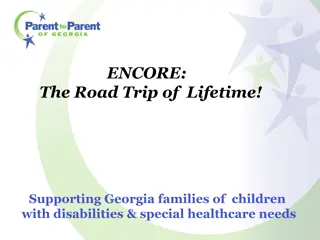Supporting Children's Communication & Swallowing Needs
This service in Hull & East Riding offers assessments, interventions, coaching, and training to support children with communication and swallowing difficulties. They work flexibly across various settings and provide thorough assessments through play and activities. The team collaborates with educational staff and families to create tailored plans for children with speech sound and language needs, ensuring consistent progress and support.
Download Presentation

Please find below an Image/Link to download the presentation.
The content on the website is provided AS IS for your information and personal use only. It may not be sold, licensed, or shared on other websites without obtaining consent from the author.If you encounter any issues during the download, it is possible that the publisher has removed the file from their server.
You are allowed to download the files provided on this website for personal or commercial use, subject to the condition that they are used lawfully. All files are the property of their respective owners.
The content on the website is provided AS IS for your information and personal use only. It may not be sold, licensed, or shared on other websites without obtaining consent from the author.
E N D
Presentation Transcript
HULL & EAST RIDING CHILDREN S SPEECH AND LANGUAGE THERAPY SERVICE Supporting children and young people with communication and swallowing difficulties. Publication Date: April 2023 Review Date: April 2024
HOW WE WORK: Where we work: We work across homes, community clinics, nurseries & pre-schools, primary & secondary schools, higher education colleges and specialist provisions. What we provide: Assessments How we work: We work flexibly, offering appointments face-to-face, over the phone and on video call. Reviews Interventions Coaching & modelling Training We may offer a screening appointment to see how we can support your child. HOW TO REFER: Visit our website to download a referral form and read more guidance on who we can support: Anyone can refer in to our service, including parents/carers, school staff and health visitors, etc.
How do we assess your childs communication? For younger children, assessments are typically done through play. At school age, we will complete different activities with your child to assess the concerns on the referral form. We will sometimes observe your child in class or playing with their peers too. ROR Review on Request After your child s assessment and/or intervention, they may be put onto review on request (ROR). This is used when we have demonstrated targets or a communication plan in the setting and staff are confident to continue with the activities. You can contact us to request a review if: they have achieved their targets you are concerned they are not making progress (despite working on the activities in the setting) the needs of the child or setting change This review may be face-to-face, via video call, or through a discussion with parents/carers or setting staff.
WHO WE SUPPORT We use speech to describe the sounds that children use in their talking, and how well theycan be understood. We use language to describe their understanding of instructions, and the words and sentences they use in their own talking. Language Difficulties Children with language needs are usually seen in their educational setting. We work with the staff supporting your child in a range of ways, including demonstrating the activities identified on their targets and delivering interventions. Speech Sound Difficulties We also give recommendations to help staff support your child s understanding and use of language throughout the day. Children with speech sound needs are usually seen in community clinics with their parents/carers. This is because it is important that parents/carers can practise the activities with the child through the week. A member of the team will liaise with school to keep them informed of your child s current targets.
Language Unit & Outreach Children with more severe speech and/or language needs may be referred for more intensive intervention. In Hull, they may be referred for a part-time placement at the Language Unit. In the East Riding, they may be referred to the Developmental Speech/Language Disorders team, who provide outreach for children in their educational settings, usually via video call. Dysphagia Dysphagia is a difficulty with eating and drinking. Children are usually seen in community clinic or at home. They may be seen on the hospital ward as an inpatient. Social Communication We support children with social communication needs with and without a formal diagnosis like Autism. We may create a communication plan with personalised strategies and advice around creating communication opportunities. We recognise the importance of working in partnership with home & the educational setting to create a communication environment that meets the child s needs.
Early Years including Complex Needs The preschool complex needs team work across Hull and the East Riding with children up to the age of 5, who have significant communication difficulties. Selective Mutism Selective Mutism (SM) is a condition associated with anxiety. The person has difficulty speaking in certain settings or with certain people. We work with families and educational settings to support confident talking, using strategies to reduce pressure and anxiety around speech. The children on the caseload usually have other additional needs such as autism, physical disabilities or underlying medical conditions as well as SLCN. Children may also be seen by another service as Selective Mutism is associated with anxiety. Special Schools Our team work closely with the staff in the special schools to review targets and set up therapy activities. They also help staff create a communication- friendly environment personalised to the children s needs.
Stammering The dysfluency team work with children of all ages to assess and provide support with dysfluent speech. Hearing Impairment We see children who have a moderate, severe, or profound permanent hearing loss in both ears. We work closely with parents, Teachers of the Deaf, education staff, and Audiologists. They offer training and resources to parents and setting. We work with children who have hearing aids or cochlear implants. We may use British Sign Language with children where appropriate. Voice Voice referrals can only be accepted following a referral from Ear Nose and Throat (ENT) consultant. We see children who have lost their voice or whose voice quality is rough/hoarse, quiet, breathy or weak.
This document is available in alternative formats on request. Email hnf-tr.communications@nhs.net or call 01482 301700. CONTACT US: hnf-tr.sltadmin@nhs.net 01482 692929 Option 3 Complaints and Feedback Team Humber Teaching NHS Foundation Trust Trust Headquarters Willerby Hill Beverly Road Willerby HU10 6ED 01482 303930 HumberNHSFT HNF-complaints@nhs.net HumberNHSFT humber.nhs.uk
